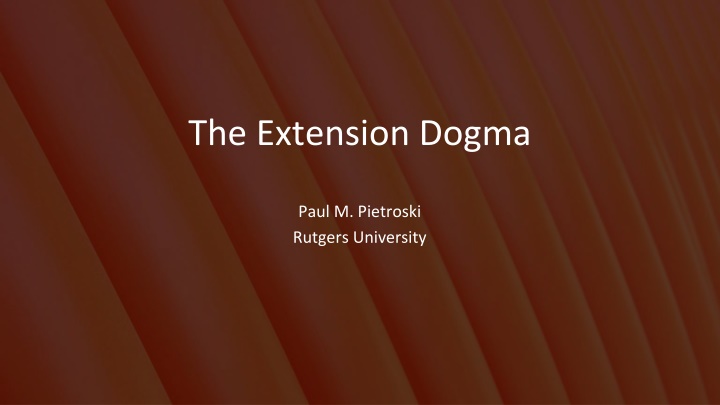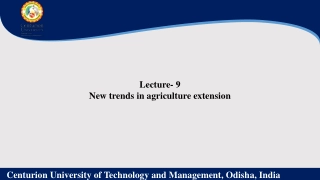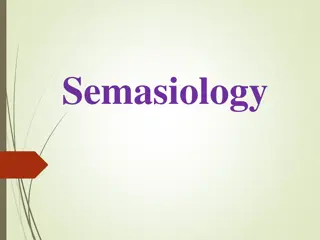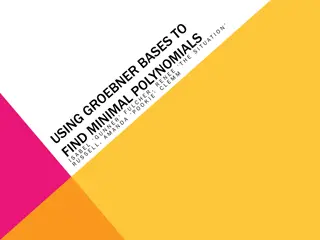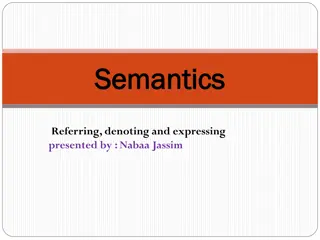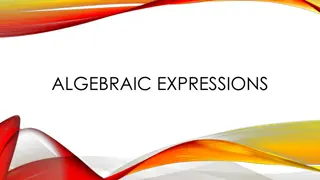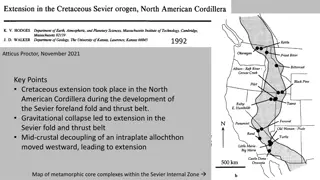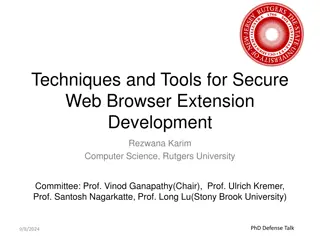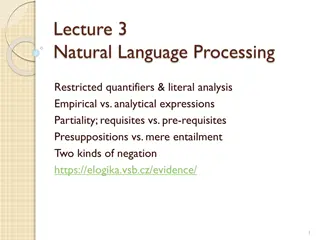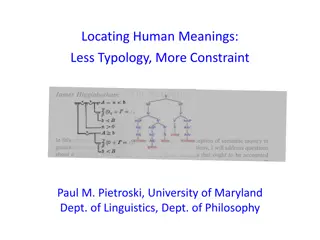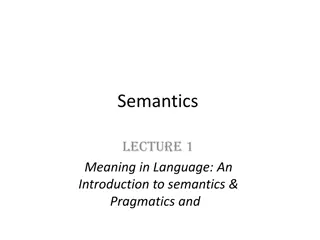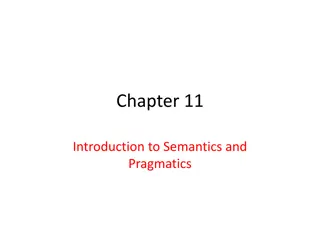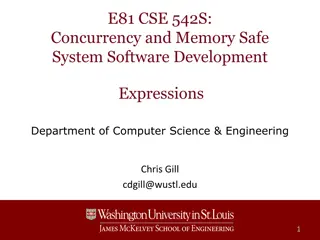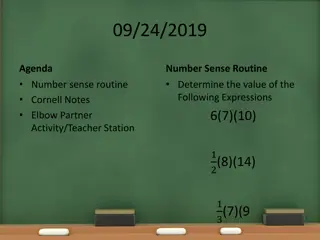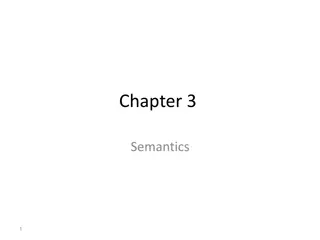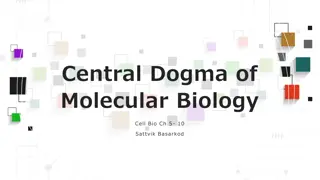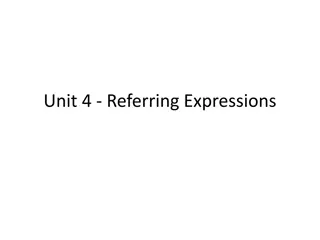The Extension Dogma: Exploring Meaning and Extensions in Linguistic Expressions
The Extension Dogma challenges the assumption that linguistic expressions inherently possess meanings. Instead, it posits that expressions have extensions without necessary meanings that determine them. Theories of meaning should focus on the extensions of expressions, while psychological studies of understanding are considered optional. The talk emphasizes the distinction between meanings and extensions in the realm of linguistic analysis.
Download Presentation

Please find below an Image/Link to download the presentation.
The content on the website is provided AS IS for your information and personal use only. It may not be sold, licensed, or shared on other websites without obtaining consent from the author.If you encounter any issues during the download, it is possible that the publisher has removed the file from their server.
You are allowed to download the files provided on this website for personal or commercial use, subject to the condition that they are used lawfully. All files are the property of their respective owners.
The content on the website is provided AS IS for your information and personal use only. It may not be sold, licensed, or shared on other websites without obtaining consent from the author.
E N D
Presentation Transcript
The Extension Dogma Paul M. Pietroski Rutgers University
The Extension Dogma: an initial characterization There are endlessly many meaningful expressions, even for a single language like spoken English. But it s not obvious that there are meanings that these expressions have. Symbols can have extensions without having meanings (or intensions or senses ) that determine the extensions. So when offering theories of meaning, we should grant that linguistic expressions have extensions, but we should not assume that these expressions have meanings in any further sense. Whatever expression meanings are if there are any they determine what, if anything, expressions are true of. So modulo worries about gathering what expressions are true of into sets: if an expression E has a meaning ?, then E has an extension that is determined by ?. Usual caveats: allow for contexts, functions, and possibilities; the extension of an expression can be a function from contexts to (functions from possibilities to) sets of entities. Corollary: psychological studies of understanding are, at best, optional additions to core semantics. semantics. AN OLD SUSPICION... There may be nothing else for semanticists to do apart from specifying extensions speakers of the same language may have very different (and perhaps alien) psychologies the semantic commonalities across speakers of a language may be exhausted by (i) a shared environment, and (ii) general constraints of rationality, as applied to communication
The Extension Dogma: Moral of The Talk There are endlessly many meaningful expressions, even for a single language like spoken English. But it s not obvious that there are meanings that these expressions have. Symbols can have extensions without having meanings (or intensions or senses ) that determine the extensions. So when offering theories of meaning, we should grant that linguistic expressions have extensions, but we should not assume that these expressions have meanings in any further sense. Whatever expression meanings are if there are any they determine what, if anything, expressions are true of. So modulo worries about gathering what expressions are true of into sets: if an expression E has a meaning ?, then E has an extension that is determined by ?. Usual caveats: allow for contexts, functions, and possibilities; the extension of an expression can be a function from contexts to (functions from possibilities to) sets of entities. Corollary: psychological studies of understanding are, at best, optional additions to core semantics. REJECT THIS TROJAN HORSE!!! If we want to describe human languages and explain the natural phenomena of linguistic understanding we shouldn t grant that human linguistic expressions have extensions we should assume that these expressions have meanings, much as they have pronunciations we shouldn t assume that meanings determine extensions and we should remember that early advocates of The Dogma were talking about ideal languages
Analogous Theses (for or another day, or Q&A) About Concepts There are many contentful concepts. But it s not obvious that there are contents that concepts have. So when offering theories of content, we should grant that concepts have extensions. But we should not assume that concepts have contents in any further sense. Whatever conceptual contents are if there are any they determine what, if anything, concepts are true of. So if a concept C has a content k, then C has an extension that is determined by k. For purposes of this talk, you can assume (pretend?) that many human concepts have extensions... --But then don t assume that the meanings I m talking about are concepts [that s The Dogma again] --Think of these meanings (if such there be) as properties of linguistic expressions --It s not obvious what these properties are...ditto for phonological and syntactic properties --But the phenomenon of homophony structural and lexical provides a decent initial guide / r f dru g n n r b k / a sheriff drew a gun near a bank$ a sheriff drew a gun near a bank a sheriff drew a gun near a bank$ a sheriff drew a gun near a bank [[drew [a gun]] [near a bank ]] [drew [a [gun [near a bank ]]] What are these (eight) meanings? Does each one determine an extension?
The Extension Dogma for Human Linguistic Meanings There are endlessly many meaningful expressions, even for a single language like spoken English. But it s not obvious that there are meanings that these expressions have. Symbols can have extensions without having meanings (or intensions or senses ) that determine the extensions. So when offering theories of meaning, we should grant that linguistic expressions have extensions, but we should not assume that these expressions have meanings in any further sense. Whatever expression meanings are if there are any they determine what, if anything, expressions are true of. So modulo worries about gathering what expressions are true of into sets: if an expression E has a meaning ?, then E has an extension that is determined by ?. Usual caveats: allow for contexts, functions, and possibilities; the extension of an expression can be a function from contexts to (functions from possibilities to) sets of entities. Corollary: psychological studies of understanding are, at best, optional additions to core semantics. semantics. SHORT FORM: meanings if such there be determine extensions; theories of meaning should specify extensions for linguistic expressions; but we shouldn t assume that there are further semantic properties to specify
Origins of The Extension Dogma: some very fast and biased history Initially, the issues were about ideal languages designed for science (math included); see Frege. Attempts to cash out Frege s talk of senses as empiricist verification procedures did not work out; see Logical Positivism. This fed suspicions that semantic notions are too hermeneutic for use in science. But Tarski showed that for a certain kind of invented language with a stipulated extensional interpretation, talk of truth is scientifically legit, given a semantic conception of truth. (This was a new use of semantic .) This fed Quine s suspicion that construing scientific notation via intensions creatures of darkness would saddle theories with unwanted analyticities sentences that would count as theorems because of how things were presented by a choice of notation, regardless of how the world is. Quine was also a behaviorist who thought there were no real facts about what natural expressions mean: on his view, linguists were at best, regimenting ordinary human modes of speech in convenient ways. Other philosophers in the Harvard Extension School followed Quine in trying to make natural language fit an extensionalist mold, thereby greasing a slide from ideal meanings determine extensions to if there are meanings, or semantic properties of any kind, they determine extensions But if we want to correctly describe the spoken/signed languages that humans regularly acquire, why insist that human linguistic meanings determine extensions?
Origins of The Extension Dogma: some very fast and biased history before 1967, the general thesis about natural language wasn t seriously considered; and it would have seemed obviously wrong...see (e.g.) Aristotle, Wittgenstein, Tarski, and Strawson at MIT in the early 1960s, studies of meaning were still overtly mentalistic (cp. 1890s: Br al, Husserl) after Davidson/Lewis/Montague/Partee/Kaplan, The Dogma became increasingly standard... but not because of any evidence for the hypothesis that ordinary expressions have extensions there were skeptics...see Chomsky, Harman, Foster, Fodor, Jackendoff... but many others accepted The Dogma while arguing that psychology also mattered; see Evans, Peacocke, Davies, Kamp, Heim, Higginbotham, Larson & Segal, ... lots of 21st century work has picked up this older thread see, e.g., recent conferences including this one most/more : Hackl (2009), Pietroski et. al. (2009), Lidz et. al. (2011), Tomaszewicz (2011), Odic et. al. (2018), Knowlton et.al. (forthcoming), ... , Wellwood (next talk) each/every/all: Vendler (1962), ... , Knowlton et.al. (forthcoming-2) http://www.terpconnect.umd.edu/ ~pietro/research/Quantifiers.html 21st century question: now that we ve recognized (yet again) that representations matter, why retain The Extension Dogma, instead of jettisoning it as an odd and implausible relic?
Davidson-style Specifications of Extensions (A1) x[TrueOf(HesperusName, x) (x = Hesperus)] (A2) x[TrueOf(planetAdj, x) Planet(x)] (A3) x[TrueOf([is a Adj]VerbPhrase, x) TrueOf( Adj, x)] (A4) True([ Name VerbPhrase]Sentence) x[TrueOf( Name, x) & TrueOf( VerbPhrase, x)] (T1) x[TrueOf([is aplanetAdj]VerbPhrase, x) TrueOf(planetAdj, x)] Planet(x)] (T2) True([HesperusName[is aplanetAdj]VerbPhrase]Sentence) x[TrueOf(HesperusName , x) & TrueOf([is aplanetAdj]VerbPhrase, x)] x[ x = Hesperus & Planet(x)]
Unwanted (but equally true) Specifications (A1*) x[TrueOf(HesperusName, x) (x = Phosphorus)] (A2*) x[TrueOf(woodchuckAdj, x) Groundhog(x)] (A3*) x[TrueOf([is a Adj]VerbPhrase, x) TrueOf( Adj, x) & ei?+ 1 = 0] (A4) True([ Name VerbPhrase]Sentence) x[TrueOf( Name, x) & TrueOf( VerbPhrase, x)] (T1*) x[TrueOf([is awoodchuckAdj]VerbPhrase, x) TrueOf(woodchuckAdj, x) & ei?+ 1 = 0] Groundhog(x) & ei?+ 1 = 0] (T2*) True([HesperusName[is awoodchuckAdj]VerbPhrase]Sentence) x[TrueOf(HesperusName , x) & TrueOf([is awoodchuckAdj]VerbPhrase, x)] x[ x = Phosphorus & Groundhog(x) & ei?+ 1 = 0] REPRESENTATION MATTERS FOR MEANING... EXTENSIONAL EQUIVALENCE IS NOT SEMANTIC EQUIVALENCE
Lewis/Montague-style Specifications of Extensions (A1) HesperusName = Hesperus (A2) groundhogAdj =?x.<e,t>Groundhog(x) (A3) [is a Adj]VerbPhrase = Adj (A4) [ Name VerbPhrase]Sentence = VerbPhrase ( Name ) (T1) [is agroundhogAdj]VerbPhrase =?x.<e,t>Groundhog(x) (T2) [HesperusName[is agroundhogAdj]VerbPhrase]Sentence = [is agroundhogAdj]VerbPhrase ( HesperusName ) = ?x.<e,t>Groundhog(x)(Hesperus) = <e,t>Groundhog(Hesperus)
Unwanted (but equally true) Specifications (A1*) HesperusName = Phosphorus (A2*) woodchuckAdj = ?x.<e,t>Groundhog(x) (A3*) [is a Adj]VerbPhrase =?x.ei?+ 1 = 0 & Adj (x) (A4) [ Name VerbPhrase]Sentence = VerbPhrase ( Name ) (T1*) [is awoodchuckAdj]VerbPhrase =?x.ei?+ 1 = 0 & <e,t>Groundhog(x) (T2*) [HesperusName[is awoodchuckAdj]VerbPhrase]Sentence = [is awoodchuckAdj]VerbPhrase ( HesperusName ) =?x.ei?+ 1 = 0 & <e,t>Groundhog(x)(Phosphorus) = ei?+ 1 = 0 & <e,t>Groundhog(Phosphorus) REPRESENTATION MATTERS FOR MEANING... EXTENSIONAL EQUIVALENCE IS NOT SEMANTIC EQUIVALENCE
Polysemy and Co-predication He dropped the book he defaced, and he plagiarized the book you wrote. Thered book was too heavy to carry, and the blue one was too hard to read. The book he stole was valuable. The book he reviewed was worthless. BOOK:VEHICLE BOOK:CONTENT Being is said in many ways. Ditto for book, window, line,... Lingua (2015, special issue) --intro to work since 1972 --many interesting papers Mind & Language (2021) --paper by Quilty-Dunn The shuttered window was nicer than the new window that Smith installed. The window that Smith installed looked worse than one she filled. A thief took the jewelry that was in the store window. A thief approached the bank window and handed teller a note. A thief knocked on the door and then broke a window. A thief crawled through a window and opened the door. WINDOW:HOLE WINDOW:FILLER ... The proof relies on the fact that the lines have no width. The man with lines in his face was in the line to buy fishing line. The triangle on the board has thick lines. LINE:PERCEPTIBLE LINE:ABSTRACTION
Homophony Polysemy bookN b k bareA b r bearV bankN$ bankN BOOK:CONTENT BOOK:VEHICLE bearN bareA, bearV, bankN$, triangleN, windowN, ... $BANK:INST $BANK:BLDG one pronunciation, two or more expressions, each with its own meaning one expression, whose meaning supports a family of concepts/subsenses --not arbitrary --often common across languages --typically arbitrary: you/ewe, die/dye, no/know, so/sew --linguistically accidental cp. Frenchseau/sceau/saut my hand, the door, a title, your temper, my calls, so much weight, an opinion, a seminar, a ridge, a course (of due east) holdV Supports Anaphora in many cases: The windows that we cut in the walls were nicer than the ones we installed. Doesn t Support Anaphora: *The banks of the river were nicer than the ones we robbed.
Homophony Polysemy bookN BOOK:CONTENT BOOK:VEHICLE b k bareA b r bearV bankN$ bankN bearN bareA, bearV, bankN$, doorN, triangleN ... $BANK:INST $BANK:BLDG REPRESENTATION MATTERS... but EXTENSIONS? one lexical item, whose meaning supports a family of concepts/subsenses one pronunciation, two or more lexical items, each with its own meaning Think about lexical acquisition. Luckily, kids are pretty good at (i) guessing which concepts speakers are expresssing and (ii) confirming/revising their initial guesses; see Gleitman and Trueswell. But if kids adopted a One Word, One Concept policy, it would be nightmarishly hard to decide when a new utterance of a word is an utterance of old word. And then homophony would presumably be way more rampant than it is. Polysemy looks like a result of kids treating homophony as a last resort strategy, with paradigm cases of polysemy involving concepts that dovetail. If kids let lexical items become polysemous, then over time, conceptually equivocal will become the norm.
Proper Nouns are also Conceptually Equivocal Textbooks (and classes) in semantics often start by assuming that Proper Nouns (e.g., Aristotle and Napoleon ) are atomic terms that designate individuals. But initial assumptions can be false. Theorists don t get to stipulate that certain nouns are singular denoters. Claims about nouns have to be justified. And prima facie, Proper Nouns are a lot like Common Nouns. Napoleon lost at Waterloo. (But cp. Greek, which disallows bare PN subjects.) There were three Napoleons at the party. Two of them were wearing hats. The third one sang. The Napoleon who sang is a good cook. Our Napoleon would never do such a thing. But the Napoleon on the soccer team would. The little Napoleon on the committee must be stopped. DP DP / \ D N the / \ N RC Napoleon who / \ D N our Napoleon that the sang No need to posit homophony instead of polysemy.
Alleged Kind Terms do not have Kinds as Extensions It is often suggested that words like rabbit and dog and water are somehow drawn to natural properties e.g., being a member of certain biological kind, or being a sample of H2O modulo trace impurities and that these properties determine extensions for the words. This suggestion is in tension with the idea, mentioned at the outset, that speakers of English can have very different psychologies. One can have various kind-concepts --a concept of the Leporids --a concept of the Lagomorphs --a concept of the European Rabbits --a concept of the Cottontail Rabbits --a concept of the local sub-genus of Cottontail Rabbits Lagomorphs Find the rabbits Leporids (60 extant species) Pikas Romerlagus (volcano rabbit) Pronolagus Poelagus (Bunyero rabbit) Neslagus (striped rabbits) Lepus (hares & jackrabbits) (red rock hares) A child can have a concept of the sort psychologists (e.g., Keil and Gelman) describe when talking about innate tendencies to essentialize Bunolagus (riverine rabbit) Oryctolagus (European rabbits) 1 species, very common Caprolagus (hispid hare) (pygmy rabbit) Brachylagus Sylvilagus (cottontails) 17 species, 3 sub-genuses Theorists can have other concepts of rabbits e.g., the Lagomorphs minus the pikas, jackrabbits, and any hares.
Alleged Kind Terms do not have Kinds as Extensions It is often suggested that words like rabbit and dog and water are somehow drawn to natural properties e.g., being a member of certain biological kind, or being a sample of H2O modulo trace impurities and that these properties determine extensions for the words. But given the biological facts, why think the nouns in a dog chased a rabbit have extensions? extensions? Lagomorphs Find the rabbits Taxonomical distinctions need not correspond to clean genetic distinctions. Leporids (60 extant species) Pikas Romerlagus (volcano rabbit) Pronolagus CANIS Poelagus (Bunyero rabbit) Neslagus (striped rabbits) Lepus (hares & jackrabbits) (red rock hares) ... latrans coyotes lupus familiaris grey domestic wolves Bunolagus (riverine rabbit) Oryctolagus (European rabbits) 1 species, very common Caprolagus (hispid hare) (pygmy rabbit) Brachylagus Sylvilagus (cottontails) 17 species, 3 sub-genuses dogs
Alleged Kind Terms do not have Kinds as Extensions It is often suggested that words like rabbit and dog and water are somehow drawn to natural properties e.g., being a member of certain biological kind, or being a sample of H2O modulo trace impurities and that these properties determine extensions for the words. But given the biological facts, why think the nouns in a dog chased a rabbit have extensions? And water is an even worse example. many examples of --very high H2O content --but not water Percentage of H2O Club Soda: Diet soda, not cola: 99.8 Tea: Diet Cola: stuff from my well < 99.4 in New Mexico 99.9 Coffee: Espresso: Ocean Water: 96.5 Bud Light: Distilled vinegar: 94.78 99.39 97.8 many examples of --lower H2O content --and yet water 99.7 99.54 95.0 So why insist that Putnam s imagined substance, XYZ, couldn t be described as water?
tofus rabbits Root Nouns can also be conceptually equivocal rabbit +CT +PL tofu +CT +PL Maybe we can specify the content of a certain mass concept of rabbit in terms of (i) a primitive count concept that applies to countable rabbits, and (ii) something like a Lewisian universal grinder (cp. Russell, Cartwright, Pelletier, Link, Chierchia, ) And maybe we can specify the content of a certain count concept of tofus in terms of (i) a primitive mass concept that applies to samples of tofu (ii) some kind of unitizer that lets us think about countable units of tofu But presumably, the uncount nouns rabbitand tofu have meanings of the same kind. Moreover, these meanings allow for errors: a child might encounter rabbit (fish, chicken, ...) on a plate and think it grows out of the ground; or someone might think that tofu comes from free-range tofus. So even if we temporarily waive concerns about whether count nouns have extensions, what s the general story for nouns without the +CT feature?
anxiety business color democracy energy fate gusto history intelligence judgment language life money morality music nature oppression philosophy religion science sincerity sky space time utility vigor vision weather wisdom wit The Extension Dogma: meanings determine extensions concept, conception meaning, meanings language, languages
Accommodating Conceptual Equivocality isnt Hard Instead of assuming that expressions have extensions, think of expressions as instructions (or recipes) for how to access and assemble concepts Instead of assuming that a theory of meaning specifies extensions for complex expressions in terms of extensions for constituent expressions, allow for theories that specify how complex expressions can be used to build concepts from polysemous constituents don t insist that the larger phrase is true of processes that (i) were done by something in the extension of linguist , and (ii) ended with events in the extension of open a window saw a linguist open a window saw a linguist don t insist that open a window is true of events of opening in which the thing opened is in the extension of window a window v open Why think that window , open , and linguist have extensions? 21
Accommodating Conceptual Equivocality isnt Hard Instead of assuming that expressions have extensions, think of expressions as instructions (or recipes) for how to access and assemble concepts Instead of assuming that a theory of meaning specifies extensions for complex expressions in terms of extensions for constituent expressions, allow for theories that specify how complex expressions can be used to build concepts from polysemous constituents saw a linguist open a window build a concept of the form: [AGENT(_, _)^LINGUIST(_)]^ [ENDED-WITH(_, _)^OPEN-WINDOW(_)] |__________|___________| |________________|_________________| saw a linguist build a concept of the form: [OPENING-OF(_ , _)^WINDOW(_)] |________________|____________| a window linguist -family v open select from the select a concept from the window -family The Extension Dogma is not the only game in town. select a concept from the open -family
The Extension Dogma (for Human Linguistic Meanings) There are endlessly many meaningful expressions, even for a single language like spoken English. But it s not obvious that there are meanings that these expressions have. Symbols can have extensions without having meanings (or intensions or senses ) that determine the extensions. So when offering theories of meaning, we should grant that linguistic expressions have extensions, but not assume that these expressions have meanings in any further sense. BEWARE THIS TROJAN HORSE If we want to describe human languages and explain the natural phenomena of linguistic understanding we shouldn t grant that the relevant expressions have extensions we should assume that these expressions have meanings, much as they have pronunciations we shouldn t assume that meanings determine extensions and we should remember that early advocates of The Dogma were talking about ideal languages For those who prefer Monty Python to Homer jettison The Trojan Rabbit
The Extension Dogma (for Human Linguistic Meanings) There are endlessly many meaningful expressions, even for a single language like spoken English. But it s not obvious that there are meanings that these expressions have. Symbols can have extensions without having meanings (or intensions or senses ) that determine the extensions. So when offering theories of meaning, we should grant that linguistic expressions have extensions, but not assume that these expressions have meanings in any further sense. BEWARE THIS TROJAN HORSE If we want to describe human languages and explain the natural phenomena of linguistic understanding we shouldn t grant that the relevant expressions have extensions we should assume that these expressions have meanings, much as they have pronunciations we shouldn t assume that meanings determine extensions and we should remember that early advocates of The Dogma were talking about ideal languages we can and should deny that human linguistic expressions have extensions Thanks, and thanks to the organizers!
WORLD WORLD ideal THOUGHT LANGUAGE THOUGHT LANGUAGE ??? natural Much of 20th Century Analytic Philosophy Traditional Picture 26
Terminological Nightmare intention, intentional, intentionality mental aims/targets aboutness of thought Brentano, Meinong, Frege, Husserl, Russell, Evans, Sainsbury, Rey, Fodor, Dretske, Millikan, intension, intensional, intensionality contrast with extension(al(ity)) failures of substitutivity opacity Frege, Church, Carnap, Quine/Goodman (as critics), Marcus, Kripke, Hintikka, Lewis, Montague, Tichy concerned with concepts composable ideas we use to think about things in various ways often with special attention to: intensions as ways of presenting extensions --Frege s Sinnen --Husserl s Noema (?) --Church s procedures or functions-in-intension ?x.|x 1| ?x. nat (x2 2x +1) --differ in kind from functions-in-extension ?x.|x 1| = ?x. nat (x2 2x +1) intensions as functions-in-extension that map each possible state, s, of the universe to a (perhaps empty) set of things that exist at s concepts like GHOST, UNICORN, PEGASUS, that apply to nothing --Lewis word values --sets that have special elements concept pairs like HESPERUS/PHOSPHORUS and WOODCHUCK/GROUNDHOG used to think about the same things in different ways
Terminological Nightmare The Extension Dogma (for Human Linguistic Meanings) highlights the question of whether or not linguistic expressions have meanings in the traditional sense of having semantic properties that present the things we talk about in certain ways; where talk about is understood in an intenTional sense that allows for talk about ghosts and unicorns, and for talkIng about ghosts on Hesperus without thereby talking about unicorns on Phosphorus. intensions as ways of presenting extensions --Frege s Sinnen --Husserl s Noema (?) --Church s procedures or functions-in-intension ?x.|x 1| ?x. nat (x2 2x +1) --differ in kind from functions-in-extension ?x.|x 1| = ?x. nat (x2 2x +1) intensions as functions-in-extension that map each possible state, s, of the universe to a (perhaps empty) set of things that exist at s --Lewis word values --sets that have special elements
Terminological Nightmare The Dogma is, however, compatible with many views about the alleged extensions. In particular, it is compatible with saying that the semantic value of a word (e.g., rabbit ) is a Lewis-style function (in extension) that maps each possible world, w, to a set of things that exist at w . The Extension Dogma (for Human Linguistic Meanings) highlights the question of whether or not linguistic expressions have meanings in the traditional sense of having semantic properties that present the things we talk about in certain ways. But it highlights this question by presupposing that meaningful expressions have extensions and inviting us to ask whether we should also assume that these extensions are determined by further semantic properties (e.g., Sinnen). intensions as ways of presenting extensions --Frege s Sinnen --Husserl s Noema (?) --Church s procedures or functions-in-intension ?x.|x 1| ?x. nat (x2 2x +1) --differ in kind from functions-in-extension ?x.|x 1| = ?x. nat (x2 2x +1) intensions as functions-in-extension that map each possible state, s, of the universe to a (perhaps empty) set of things that exist at s --Lewis word values --sets that have special elements
Terminological Nightmare I agree that a lexical item L does not present the things we talk about (with L) in any particular way, except in a very boring sense: uses of L will be associated with concepts we can express with L; and concepts have contents that we can describe as senses. But we need to abandon the myth of One Word, One Concept. The Extension Dogma (for Human Linguistic Meanings) highlights the question of whether or not linguistic expressions have meanings in the traditional sense of having semantic properties that present the things we talk about in certain ways. But it highlights this question by presupposing that meaningful expressions have extensions and inviting us to ask whether we should also assume that these extensions are determined by further semantic properties (e.g., Fregean senses). intensions as ways of presenting extensions --Frege s Sinnen --Husserl s Noema (?) --Church s procedures or functions-in-intension ?x.|x 1| ?x. nat (x2 2x +1) --differ in kind from functions-in-extension ?x.|x 1| = ?x. nat (x2 2x +1) intensions as functions-in-extension that map each possible state, s, of the universe to a (perhaps empty) set of things that exist at s --Lewis word values --sets that have special elements
